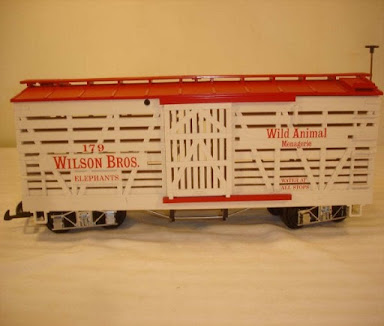The Old LGB's main income was always generated in Germany but it was the USA who often came in a close second before the Europeans (Switzerland, France, Italy, Austria) who loved LGB products just as much. It was therefor an important part of the product arrangement to offer interesting locos and rolling stock to the American customers with each new year and catalog.
The Mogul made the start (1983/85) followed by other great American locomotives like the Forney, the Uintah and Sumpter Valley, The F 7, Alco Diesel and others. On the lookout for yet another new loco for the American market the little Chloe came into focus. She had two things going for her:
#1 Disney Connection
Ward Kimball, Disney's foremost animator was a huge train lover and had built his own 'Grizzly Flats Railroad" on his land in California with a Chloe in his collection. He had bought the engine in 1948 from the Hawaiian RR upon its demise and had lovingly restored the little loco while putting his own famous (painter's) touch on her.
 |
Grizzly Flats RR Chloe - Courtesy of Grizzly Flats RR
|
#2 A True Narrow Gauge Loco
(Quote): "Although the type was not used by any major railroads in North America, H.K. Porter, Inc. and the Baldwin Locomotive Works produced many small tank locomotives of this type for industrial and plantation work. The 0-4-2T Olomana, built by Baldwin in 1883, arrived in the Kingdom of Hawaii in August 1883 after a two-month journey around Cape Horn. It was owned by Waimanalo Sugar Company on the island of Oahu and hauled cane from the fields to its refinery (see https://en.wikipedia.org/wiki/0-4-2)

Courtesy of wikipedia.org
LGB named the Chloe the LGB 20130 and the Olomana type 0-4-2 field loco became LGB 20140.
These LGB 0-4-2 's were published over the years:
Class 20130
Year LGB #
1995 20130
1998 22130
2002 21130 actually loco for # 72560 starter set/ Christmas set
2016 23130 by Simba/Dickie - Maerklin/LGB
Class 20140
Year LGB #
1995 20140
----------------------------------------------------------------------------
Below find the LGB locos that are sort of in the same category but are actually 0-4-0 locos of the field loco type. The original was built by Orenstein & Koppel, a German engineering and rail car manufacturer who sold these types almost worldwide from 1880 to about 1920.
1998 21140
2002 22140
2003 23140
 |
A typical 0-4-0 Orenstein & Koppel loco ca 1910
Courtesy of Kolin at 1.loco.eu
|
LGB used the chassis of the 21140 also for the Toy Train series and for the Porter series.
The 0-4-2 and 0-4-0 loco type proved to be so beloved that the New LGB under Marklin/Simba Dickie published several of these and as an exception to the rule this blog will either refer to them or include them in this series.
+++++++++++++++++++++++++++++++++ to be continued........................











































